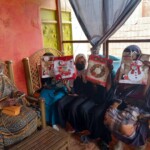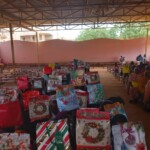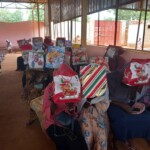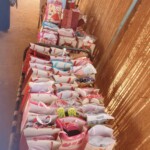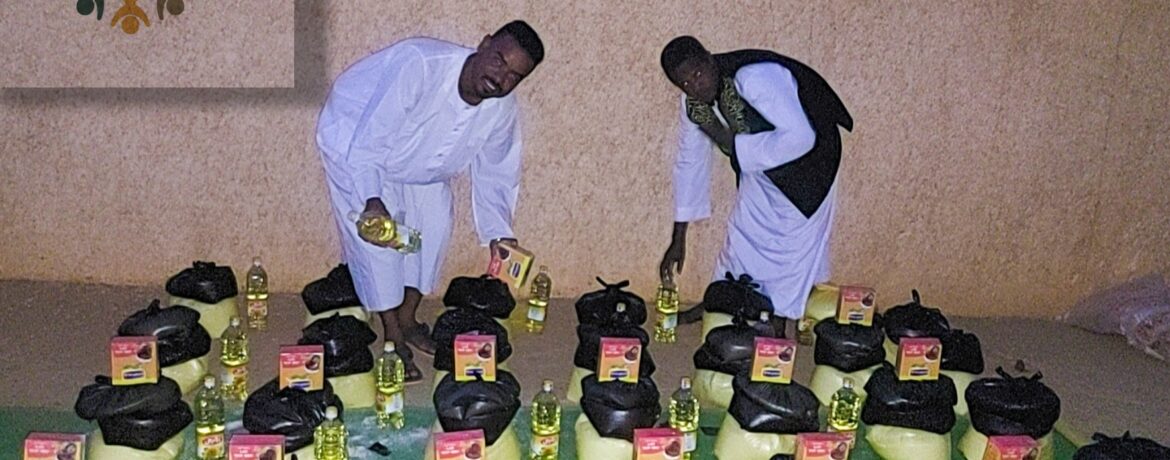
Organization: Swaidna for Sustainable Development
Project Code: B0100
Project Type: Food Support
Activities: Supporting communal kitchens and distributing food baskets
Beneficiaries: Displaced persons from conflict areas and residents of various neighborhoods Implementation
Location: Karari Locality – Omdurman Locality
Implementation Period: October 2024
Executive Summary: The Food Support project, implemented by Swaidna for Sustainable Development, aims to alleviate the burden on families affected by Repercussions of the April 15 War, and to provide them with food security. This was achieved through direct food support via communal kitchens and the distribution of food baskets. The project was implemented in Karari and Omdurman localities during October 2024, targeting displaced persons from conflict areas and residents of various neighborhoods.
Project Objectives:
Provide daily meals to beneficiaries through communal kitchens.
Distribute diverse food baskets to cover the basic food needs of targeted families.
Improve food security and nutrition among beneficiary families.
Contribute to alleviating the humanitarian suffering caused by crises.
Methodology:
Beneficiaries were identified through field surveys conducted by volunteers and in cooperation with government agencies.
Communal kitchens were equipped with the necessary tools and equipment to prepare meals.
Diverse food baskets containing essential food items were purchased and distributed to targeted families.
Regular follow-ups were conducted to assess project performance and ensure that aid reached the intended beneficiaries.
Results:
Quantitatively, 210 breakfast meals were served daily through 6 communal kitchens (2 in Omdurman and 4 in Karari). 100 food baskets were distributed, providing families with enough food for 15-25 days. The project served approximately 1,400 families (equivalent to 8,400 individuals).
Qualitatively, the project significantly improved beneficiaries’ lives by providing daily meals, relieving families of the burden of preparing daily meals, especially for children, women, and the elderly. By providing daily meals, families were able to allocate more funds to other daily needs. The project also fostered cooperation and social cohesion among community members and raised awareness about the importance of proper nutrition.
Comparison with Objectives:
The primary objective of the project was partially achieved. While the support provided through communal kitchens was effective, the duration of support was limited to a maximum of 25 days, whereas the intended goal was to provide continuous support.
Challenges and Lessons Learned: The project faced several challenges, including:
Lack of funding
Difficulty in reaching some areas
Changes in humanitarian conditions
High food prices
Difficulty in accurately assessing the food needs of each family, resulting in variations in the size of distributed food baskets.
Recommendations and Sustainability:
Develop a more accurate system for assessing food needs.
Expand the project to cover more affected areas and implement training programs for beneficiaries on home gardening to enhance food security in the long term.
Provide more specialized training workshops for volunteers and staff to improve performance.
Identify sustainable funding sources for the project.
Expand partnerships with the private sector and international organizations to ensure the continuity of financial and logistical support.
Integrate the project into government programs to ensure continued government support for emergency food projects.
Address gender dimensions in the project, as women are often more affected by food crises.
Empower local communities through training in home gardening and resource management.
This summary provides a comprehensive overview of the project, its achievements, challenges, and recommendations for the future. It highlights the project’s positive impact on beneficiary families and the community as a whole.
Key Activities
enhance health and environmental
awareness
Providing free medical services
Distribute Hygiene kits
Our Gallery
![{"remix_data":[],"remix_entry_point":"challenges","source_tags":["local"],"origin":"unknown","total_draw_time":0,"total_draw_actions":0,"layers_used":0,"brushes_used":0,"photos_added":0,"total_editor_actions":{},"tools_used":{"transform":2},"is_sticker":false,"edited_since_last_sticker_save":true,"containsFTESticker":false}](https://swaidna.org/wp-content/uploads/cache/2025/02/Picsart_25-01-01_12-30-01-956/2268098108.jpg)
![{"remix_data":[],"remix_entry_point":"challenges","source_tags":["local"],"origin":"unknown","total_draw_time":0,"total_draw_actions":0,"layers_used":0,"brushes_used":0,"photos_added":0,"total_editor_actions":{},"tools_used":{"transform":1},"is_sticker":false,"edited_since_last_sticker_save":true,"containsFTESticker":false}](https://swaidna.org/wp-content/uploads/cache/2025/02/Picsart_25-01-01_09-24-35-172/3528027206.jpg)
![{"remix_data":[],"remix_entry_point":"challenges","source_tags":["local"],"origin":"unknown","total_draw_time":0,"total_draw_actions":0,"layers_used":0,"brushes_used":0,"photos_added":0,"total_editor_actions":{},"tools_used":{},"is_sticker":false,"edited_since_last_sticker_save":false,"containsFTESticker":false}](https://swaidna.org/wp-content/uploads/cache/2025/02/Picsart_25-01-01_09-32-00-200/2241025158.jpg)
![{"remix_data":[],"remix_entry_point":"challenges","source_tags":["local"],"origin":"unknown","total_draw_time":0,"total_draw_actions":0,"layers_used":0,"brushes_used":0,"photos_added":0,"total_editor_actions":{},"tools_used":{},"is_sticker":false,"edited_since_last_sticker_save":false,"containsFTESticker":false}](https://swaidna.org/wp-content/uploads/cache/2025/02/Picsart_25-01-01_09-26-09-387/2069365055.jpg)
![{"remix_data":[],"remix_entry_point":"challenges","source_tags":["local"],"origin":"unknown","total_draw_time":0,"total_draw_actions":0,"layers_used":0,"brushes_used":0,"photos_added":0,"total_editor_actions":{},"tools_used":{},"is_sticker":false,"edited_since_last_sticker_save":false,"containsFTESticker":false}](https://swaidna.org/wp-content/uploads/cache/2025/02/Picsart_25-01-01_12-04-52-187/2041455254.jpg)
![{"remix_data":[],"remix_entry_point":"challenges","source_tags":["local"],"origin":"unknown","total_draw_time":0,"total_draw_actions":0,"layers_used":0,"brushes_used":0,"photos_added":0,"total_editor_actions":{},"tools_used":{},"is_sticker":false,"edited_since_last_sticker_save":false,"containsFTESticker":false}](https://swaidna.org/wp-content/uploads/cache/2025/02/Picsart_25-01-01_11-48-52-356/1846277437.jpg)
![{"remix_data":[],"remix_entry_point":"challenges","source_tags":["local"],"origin":"unknown","total_draw_time":0,"total_draw_actions":0,"layers_used":0,"brushes_used":0,"photos_added":0,"total_editor_actions":{},"tools_used":{},"is_sticker":false,"edited_since_last_sticker_save":false,"containsFTESticker":false}](https://swaidna.org/wp-content/uploads/cache/2025/02/Picsart_25-01-01_09-35-33-589/170934430.jpg)
![{"remix_data":[],"remix_entry_point":"challenges","source_tags":["local"],"origin":"unknown","total_draw_time":0,"total_draw_actions":0,"layers_used":0,"brushes_used":0,"photos_added":0,"total_editor_actions":{},"tools_used":{},"is_sticker":false,"edited_since_last_sticker_save":false,"containsFTESticker":false}](https://swaidna.org/wp-content/uploads/cache/2025/02/Picsart_25-01-01_12-31-42-712/1685622488.jpg)

